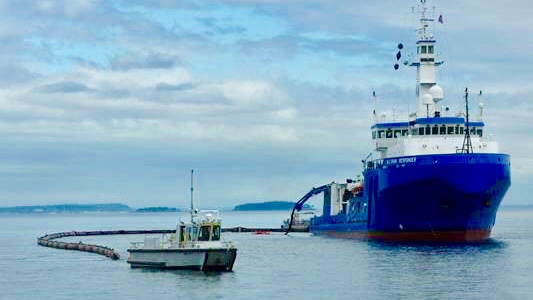Nine oil companies and their response contractors will practice responding to an oil spill on the Columbia River today. The drill will be highly visible from the Interstate 5 bridge between Washington and Oregon as crews launch boats, oil skimming vessels and floating containment boom.
The consequences of a major oil spill in the river would be high for both Washington and Oregon. Under Washington law, these companies are required to develop oil spill response contingency plans and to conduct regular drills to carry out those plans.
“A major oil spill on the river is something that we hope we never have to deal with for real, but we have to be ready,” said Dale Jensen, manager of the Department of Ecology Spills Program. “Drills like this are absolutely necessary so that we are ready to roll rapidly and in a well-coordinated way if we get that call.”
Each year, oil-carrying vessels deliver more than a billion gallons of refined petroleum products, like gasoline and jet fuel, to ports on the Columbia River in Washington and Oregon. Along the river’s shoreline, oil trains carry heavy crude that, if it were to spill, could sink and be difficult to recover. The Washington Legislature made preparing for that type of oil a priority under the 2018 Strengthening Oil Spill Transportation Act, and today’s drill will put the latest technology for capturing heavy, sinking oil to the test.
Another goal of today’s exercise is to demonstrate that multiple oil companies, spill response contractors, state, local and federal agencies, and Tribes can all work together conduct a rapid, aggressive and effective response using spill response equipment staged nearby and dedicated to the river.
The participating companies include:
- Maritime Fire & Safety Association
- Tidewater Terminals
- BNSF Railway Company
- Tesoro
- Olympic Pipeline
- NuStar Energy, LP
- Harley Marine Services, Inc.
- Polar Tankers
- Alaska Tanker Company
The participating spill response contractors are Clean Rivers Cooperative, Marine Spill Response Corporation, Clean Harbors, National Response Corporation, and Tidewater Environmental Services.
The Washington Department of Ecology is overseeing the exercise, with participation by the Oregon Department of Environmental Quality, the U.S. Environmental Protection Agency, the U.S. Coast Guard, Clark Regional Emergency Services Agency, Portland Bureau of Emergency Management, and the Port of Vancouver USA.


